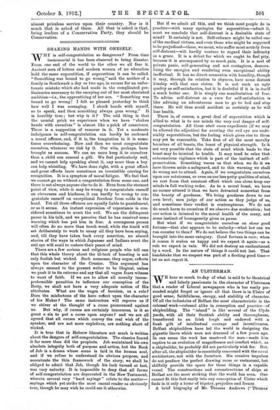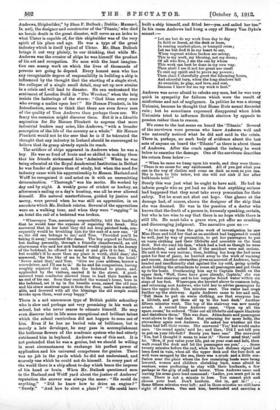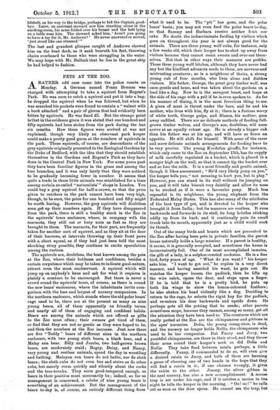AN ULSTERMAN.
WE hear so much to-day of what is said to be theatrical and falsely passionate in the character of Ulstermen that a reader of Liberal newspapers who is too easily per- suaded might forget or ignore all that there is in Ulster of good sense, faithfulness, energy, and stability of character. Of all the industries of Belfast the most characteristic is the colossal work—colossal alike in conception and practice—of shipbuilding. The "island" is like several of the Clyde yards, with all their Scottish ability and thoroughness, transferred to an Irish lough and endowed with a fresh gift of intellectual courage and inventiveness. Belfast shipbuilders have led the world in designing the gigantic liners which were not dreamed of a few years ago. In one sense the work has mastered the man—made him captive to an evolution of magnificence and comfort which, as a shipbuilder, he probably did not particularly wish for. But, after all, the shipbuilder is essentially concerned with the naval architecture, not with the furniture. His creative impulses do not produce the perfect drawing room or restaurant, but skilfully provide the space for those things in a capable vessel. The constructions and reconstructions of ships at Belfast are the most striking that the world has seen. One
cannot fit this fact easily into any conception of Ulster which finds in it only a home of bigotry, prejudice and frenzy.
A brief biography of Mr. Thomas Andrews (" Thomas Andrews, Shipbuilder," by Shan F. Bullock ; Dublin: Idauntsel, ls. net), the designer and constructor of the Titanic,' who died
an heroic, death in the great disaster, will serve as an index to what Ulster is capable of, for this shipbuilder was of the very
spirit of his place and age. He was a type of the great . industry which is itself typical of Ulster. Mr. Shan Bullock brings it out very plainly, to our thinking, that while Mr. Andrews was the creator of ships he was himself the product of his art and occupation. No man with the _least imagina- tion can scamp work on which the lives of thousands of persons are going to depend. Every honest man who has any recognizable degree of responsibility in building a ship is influenced by the thought that the starting of a single rivet, the .collapse of a single small detail, may set up new strains in a crisis and will lead to disaster. He can understand the sentiment of London Dodd in "The Wrecker," when the brig resists the batterings of the storm: " God bless every man who swung a mallet noon her! " Sir Horace Plunkett, in his Introduction, seems to think that there are even fewer men of the quality of Tom Andrews than perhaps there are. We fancy the occasion might discover them. But it is a likeable aspiration for Sir Horace Plunkett to express that more industrial leaders may arise, like Andrews, " with a broader ,conception of the, life of the country as a whole." Sir Horace Plunkett would not be the seer that he is if he tolerated the thought that any industry in Ireland should be encouraged to believe that its grasp already equals its reach.
The artificer of ships appeared in Andrews when he was a boy. He was so fond of boats and so skilled in making them .that his friends nicknamed him "Admiral." When he was
being.educated at the Royal Academical Institution in Belfast he was fonder of games than of study, but when the need fort. industry came with his apprenticeship to Messrs. Harland and, Wolff be recognized it and acted on it with an unremitting
determination. ".Thorough" was his motto. He worked by day and by night. A weekly game of cricket or hockey, an Afternoon's sailing or a day's hunting, was all he ever allowed; himself. His natural masterfulness, guided by justice and mercy, were proved when he was still an apprentice, in an anecdote which Mr. Bullock relates. Several of the apprentices
were on a walking tour, and when they were "ragging" in An hotel the, rail of a bedstead was broken.
" Whereupon Tom, assuming responsibility, told the landlady that he would bear the expense of repairing the break. She answered that in her hotel they did not keep patched beds, eon- sequently would be troubling him for the cost of a new one. 'If so, the old one belongs to me,' said Tom. 'Provided you'll be taking it away, countered the dame. The boy argued no further, but finding presently, through a friendly chambermaid, an old eharwoman who said her sick husband would rejoice in the luxury of the bedstead, he offered to mend it and give it to her. 'Al; but wouldn't it be more than my place is worth, child dear: she sinswered, 'for the like of- ma to be taking it from the hotel! ' Never mind that,' said Tom. 'Give me your address, borrow a screwdriver, and I'll see to it..' So he and his companions, having roughly repaired the rail, took the bedstead to pieces, and, applauded by the visitors, carried it to the street. A good- natured tram conductor allowed them to load their burden on an end of his ear. Soon they reached the woman's home, bore in the bedstead, set it up in the humble room, raised the old man and his straw mattress upon it from the floor, made him comfort- able, and dowered with all the blessings the old couple could invoke upon them, went away happy."
There is a not uncommon type of British public schoolboy who is slow and perhaps not very promising in his work at school, but who never ceases to educate himself. He may even discover late in life some exceptional and brilliant talent which the school curriculum did not happen to coax out of Mini. Even if he has no buried vein of brilliance, but is merely a late developer, he may pass in accomplishment the hothouse flowers of the academic system who had utterly Outclassed him in boyhood. Andrews was of this sort. It is not pretended that he was a genius, but we should be willing hi most circumstances to exchange his perfect power of application and his universal competence for genius. There was no job in the yards' which be did not understand, and scarcely one which he could not do himself. In every part of the world there is a ship afloat to-day which bears the impress of his hand or brain. When Mr. Bullock questioned men in the Harland and Wolff yard about the justice of Andrews' reputation the answer was always the same : " He could do anything." " Did he know how to drive an engine ? " " Surely." "And how to rivet a /Ate ? " He could have built a ship himself, and fitted her—yes, and sailed her too." In his .room Andrews had hung a copy of Henry Van Dyke's sonnet :-
"Let me but do my work from day to day In field or forest, at the desk or loom, In roaring market-place, or tranquil room; Let me bat find it in my heart to say,
When vagrant wishes beckon me astray, This is my work, my blessing, not my doom; Of all who live, I am the one by whom
This work can best be done in my own way.
Then shall I see it not too great nor small To suit my spirit and to prove my powers ; Then shall I cheerfully greet the labouring hours, And cheerful turn, when the long shadows fail At eventide, to play, and love, and rest, Because I know for me my work is best."
Andrews was never afraid to rebuke any man, but he was very quick in sympathy for failures which were the result of misfortune and not of negligence. In politics he was a strong Unionist, because he thought that Home Rule meant financial ruin ; but he sometimes expressed disapproval when Irish Unionists tried to influence British electors by appeals to passion rather than to reason.
We come to the last scene on board the Several of the survivors were persona who knew .Andrews well and who naturally noticed what he did and said in the crisis. There is, perhaps, no such body of evidence about the last acts of anyone on board the Titania' as there is about those of Andrews. After the crash against the iceberg be went below to examine the damage. One of the survivors describes his return from below :—
" When ho came we hung upon his words, and they were theses There is no cause for any excitement All of you get what you can in the way of clothes and come on deck as soon as you can. She is torn to bits below, but she will not sink if her after bulkheads hold.'" Surely this was just what he ought to have said. He had to inform people who as yet had no idea that anything serious had happened that they must take every precaution for their safety. Yet he must not shut out hope. One glance at the damage had, of course, shown the designer of the ship that she was doomed. He was in the position of a doctor who knows that the death of a person is, humanly speaking, certain, but who is too wise to say that there is no hope while there is still life. He must take a grave view, yet offer no crushing and discouraging judgment. The narrative goes en :-- "As he came up from the grim work of investigation he saw Miss Sloan and told her that as an accident had happened it would be well, just by way of precaution, to get her passengers to put on warm clothing and their lifebelts and assemble on the boat deck. But she read his face, which had a look as though he were heart-broken,' and asked him if the accident were not serious. He said it was very serious; then, bidding her keep the bad news quiet for fear of panic, he hurried away to the work of warning and rescue. Another stewardess gives an account of Andrews, bare- headed and insufficiently clad against the icy cold, going quietly about bidding the attendants to rouse all passengers and get them up to the boats. Overhearing him say to Captain Smith on the upper deck, Well, three have gone already, Captain, she ran to the lower stairway and to her surprise found water within six steps of her feet. Whereupon she hnrried above to summon help, and returning met Andrews, who told her to advise passengers to leave the upper deck. Ten minutes went. The water had crept further up the stairway. Again Andrews came to her and said, Tell them to put on warm clothing, see that everyone has a lifebelt, and get them all up to the boat deck.' Another fifteen minutes went. The top of the stairway was now nearly awash. A second time Andrews came. Open up all the spare rooms, he ordered. 'Take out all lifebelts and spare blankets and distribute them? This was done. Attendants and passengers went above to the boat deck. But returning for more belts, the stewardess again met Andrews. He asked her whether all the ladies had left their rooms. She answered Yes: but would make sure. Go round again,' said he ; and then, Did I not tell you to put on your life-belt? Surely you have one.' She answered 'Yes, but I thought it mean to wear it.' Never mind that,' said he. 'Now, if you value your life, put on your coat and belt, then walk round the deck and let the passengers see you.' . . Sonic twenty minutes before the end, when the last distress signal had been fired in vain, when all the upper deck and the fore deck as well were ravaged by the sea, there was a crush and a little con- fusion near the place where the few remaining boats were being lowered, women and children shrinking back, some afraid to venture, some preferring to stay with their husbands, a few perhaps in the grip of cold and terror. Then Andrews came and waving his arms gave loud command: `Ladies, you must get in at once. There is not a minute to lose. Ton cannot pick and choose your boat. Don't hesitate. Get in, get in . . . Some fifteen minutes were left : and in those minutes we still have sight of Andrews. One met him, bareheaded and carrying a lifebelt, on his way to the bridge, perhaps to bid the Captain good- bye. Later, an assistant steward saw him standing alone in the smoking-room, his arms folded over his breast and the belt lying on a table near him. The steward asked him, ' Aren't you going to have a try for it, Mr. Andrews?' He never answered or moved, just stood like one stunned.' "
The last and grandest glimpse caught of Andrews showed Lim on the boat deck, as it sank beneath his feet, throwing chairs overboard to those who were struggling in the water. We may hope with Mr. Bullock that he lies in the great ship he had helped to fashion.




































































 Previous page
Previous page